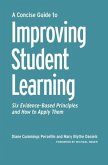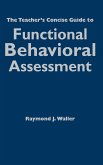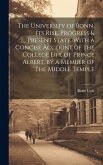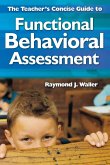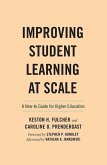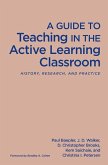Diane Cummings Persellin, Mary Blythe Daniels
A Concise Guide to Improving Student Learning
Six Evidence-Based Principles and How to Apply Them
Diane Cummings Persellin, Mary Blythe Daniels
A Concise Guide to Improving Student Learning
Six Evidence-Based Principles and How to Apply Them
- Broschiertes Buch
- Merkliste
- Auf die Merkliste
- Bewerten Bewerten
- Teilen
- Produkt teilen
- Produkterinnerung
- Produkterinnerung
This concise guidebook is intended for faculty who are interested in engaging their students and developing deep and lasting learning, but do not have the time to immerse themselves in the scholarship of teaching and learning.
Andere Kunden interessierten sich auch für
![A Concise Guide to Improving Student Learning A Concise Guide to Improving Student Learning]() Diane Cummings PersellinA Concise Guide to Improving Student Learning173,99 €
Diane Cummings PersellinA Concise Guide to Improving Student Learning173,99 €![A Concise Guide to the Town and University of Cambridge in Four Walks With an Additional Walk Through Ely Cathedral and Its Precincts A Concise Guide to the Town and University of Cambridge in Four Walks With an Additional Walk Through Ely Cathedral and Its Precincts]() John Willis ClarkA Concise Guide to the Town and University of Cambridge in Four Walks With an Additional Walk Through Ely Cathedral and Its Precincts32,99 €
John Willis ClarkA Concise Guide to the Town and University of Cambridge in Four Walks With an Additional Walk Through Ely Cathedral and Its Precincts32,99 €![The Teacher's Concise Guide to Functional Behavioral Assessment The Teacher's Concise Guide to Functional Behavioral Assessment]() Raymond J. WallerThe Teacher's Concise Guide to Functional Behavioral Assessment57,99 €
Raymond J. WallerThe Teacher's Concise Guide to Functional Behavioral Assessment57,99 €![The University of Bonn, Its Rise, Progress & Present State. With a Concise Account of the College Life of Prince Albert, by a Member of the Middle Tem The University of Bonn, Its Rise, Progress & Present State. With a Concise Account of the College Life of Prince Albert, by a Member of the Middle Tem]() Bonn UnivThe University of Bonn, Its Rise, Progress & Present State. With a Concise Account of the College Life of Prince Albert, by a Member of the Middle Tem32,99 €
Bonn UnivThe University of Bonn, Its Rise, Progress & Present State. With a Concise Account of the College Life of Prince Albert, by a Member of the Middle Tem32,99 €![The Teacher's Concise Guide to Functional Behavioral Assessment The Teacher's Concise Guide to Functional Behavioral Assessment]() Raymond J. WallerThe Teacher's Concise Guide to Functional Behavioral Assessment27,99 €
Raymond J. WallerThe Teacher's Concise Guide to Functional Behavioral Assessment27,99 €![Improving Student Learning at Scale Improving Student Learning at Scale]() Keston H. FulcherImproving Student Learning at Scale180,99 €
Keston H. FulcherImproving Student Learning at Scale180,99 €![A Guide to Teaching in the Active Learning Classroom A Guide to Teaching in the Active Learning Classroom]() Paul BaeplerA Guide to Teaching in the Active Learning Classroom173,99 €
Paul BaeplerA Guide to Teaching in the Active Learning Classroom173,99 €-
-
-
This concise guidebook is intended for faculty who are interested in engaging their students and developing deep and lasting learning, but do not have the time to immerse themselves in the scholarship of teaching and learning.
Produktdetails
- Produktdetails
- Verlag: Routledge
- Seitenzahl: 130
- Erscheinungstermin: 16. Juli 2014
- Englisch
- Abmessung: 229mm x 152mm x 7mm
- Gewicht: 201g
- ISBN-13: 9781620360927
- ISBN-10: 1620360926
- Artikelnr.: 40757028
- Herstellerkennzeichnung
- Libri GmbH
- Europaallee 1
- 36244 Bad Hersfeld
- gpsr@libri.de
- Verlag: Routledge
- Seitenzahl: 130
- Erscheinungstermin: 16. Juli 2014
- Englisch
- Abmessung: 229mm x 152mm x 7mm
- Gewicht: 201g
- ISBN-13: 9781620360927
- ISBN-10: 1620360926
- Artikelnr.: 40757028
- Herstellerkennzeichnung
- Libri GmbH
- Europaallee 1
- 36244 Bad Hersfeld
- gpsr@libri.de
Diane Cummings Persellin is Professor and Coordinator of Music Education at Trinity University in San Antonio, Texas. An author of over 100 articles and book chapters, her research interests focus on teacher preparation, professional development in higher education, and applications of research on learning. Currently, she is Director of the Trinity University Summer Program for Music Educators, a staff member of the Associated Colleges of the South Teaching and Learning Workshop, and on editorial boards of College Teaching and Texas Music Education Research. Most recently she helped develop Trinity's new Collaborative for Learning and Teaching as its interim co-director. Dr. Persellin has served as Editor of General Music Today and as President of Texas Music Educators Conference and has presented numerous workshops and papers at national and international conferences including POD and Lilly. An award-winning teacher and advisor, she was inducted into the San Antonio Women's Hall of Fame for her work in education. Mary Blythe Daniels is Stodghill Professor of Spanish at Centre College. Dr. Daniels was named Centre College's National Endowment for the Humanities Distinguished Professor and has also received the Kirk Award for Excellent Teaching. She has a strong background in literature, language instruction, and pedagogy in higher education. Her diverse research interests have led her to publish articles about seventeenth-century Spanish theater and about community-based learning. Daniels' work in experiential and community-based learning has been presented on college campuses, at national conferences and has received significant external funding. Daniels is a staff member of the Associated Colleges of the South's Teaching and Learning Workshop, and has presented at national and international conferences including POD and Lilly.
Foreword Preface Introduction. Knowing About Learning Informs Our Teaching
1 Deeper Learning and Better Retention Principle 1. Desirable Difficulties
Increase Long-Term Retention Workshop 1.1. Concept Maps Principle 2.
Meaningful and Spaced Repetition Increases Retention Principle 3. Emotion
and Relevance Deepen Learning Workshop 3.1. Community-Based Learning 2
Actively Engaged Learning Principle 4. Multisensory Instruction Deepens
Learning Workshop 4.1. The Flipped Classroom Principle 5. Small Groups
Engage Students Workshop 5.1. Problem-Based Learning Workshop 5.2.
Process-Oriented Guided-Inquiry Learning 3 Assessment Principle 6.
Formative Assessment or Low-Stakes Evaluation Strengthens Retention
Workshop 6.1. Grading, Summative Assessment, and High-Stakes Evaluation
6.1A. Creating Assessment Tools 6.1B. Constructing Rubrics 6.1C. Tips for
Grading Papers and Essay Exams Workshop 6.2. Soliciting Midsemester Student
Feedback to Improve a Course Appendix A. Course Design Workshops Workshop
A.1. The Syllabus Workshop A.2. Strategies for the First and Last Days of
Class Appendix B. Workshop on Lectures and Minilectures. Planning and
Delivery Appendix C. Workshop on Classroom Discussions Bibliography Index
1 Deeper Learning and Better Retention Principle 1. Desirable Difficulties
Increase Long-Term Retention Workshop 1.1. Concept Maps Principle 2.
Meaningful and Spaced Repetition Increases Retention Principle 3. Emotion
and Relevance Deepen Learning Workshop 3.1. Community-Based Learning 2
Actively Engaged Learning Principle 4. Multisensory Instruction Deepens
Learning Workshop 4.1. The Flipped Classroom Principle 5. Small Groups
Engage Students Workshop 5.1. Problem-Based Learning Workshop 5.2.
Process-Oriented Guided-Inquiry Learning 3 Assessment Principle 6.
Formative Assessment or Low-Stakes Evaluation Strengthens Retention
Workshop 6.1. Grading, Summative Assessment, and High-Stakes Evaluation
6.1A. Creating Assessment Tools 6.1B. Constructing Rubrics 6.1C. Tips for
Grading Papers and Essay Exams Workshop 6.2. Soliciting Midsemester Student
Feedback to Improve a Course Appendix A. Course Design Workshops Workshop
A.1. The Syllabus Workshop A.2. Strategies for the First and Last Days of
Class Appendix B. Workshop on Lectures and Minilectures. Planning and
Delivery Appendix C. Workshop on Classroom Discussions Bibliography Index
Foreword Preface Introduction. Knowing About Learning Informs Our Teaching
1 Deeper Learning and Better Retention Principle 1. Desirable Difficulties
Increase Long-Term Retention Workshop 1.1. Concept Maps Principle 2.
Meaningful and Spaced Repetition Increases Retention Principle 3. Emotion
and Relevance Deepen Learning Workshop 3.1. Community-Based Learning 2
Actively Engaged Learning Principle 4. Multisensory Instruction Deepens
Learning Workshop 4.1. The Flipped Classroom Principle 5. Small Groups
Engage Students Workshop 5.1. Problem-Based Learning Workshop 5.2.
Process-Oriented Guided-Inquiry Learning 3 Assessment Principle 6.
Formative Assessment or Low-Stakes Evaluation Strengthens Retention
Workshop 6.1. Grading, Summative Assessment, and High-Stakes Evaluation
6.1A. Creating Assessment Tools 6.1B. Constructing Rubrics 6.1C. Tips for
Grading Papers and Essay Exams Workshop 6.2. Soliciting Midsemester Student
Feedback to Improve a Course Appendix A. Course Design Workshops Workshop
A.1. The Syllabus Workshop A.2. Strategies for the First and Last Days of
Class Appendix B. Workshop on Lectures and Minilectures. Planning and
Delivery Appendix C. Workshop on Classroom Discussions Bibliography Index
1 Deeper Learning and Better Retention Principle 1. Desirable Difficulties
Increase Long-Term Retention Workshop 1.1. Concept Maps Principle 2.
Meaningful and Spaced Repetition Increases Retention Principle 3. Emotion
and Relevance Deepen Learning Workshop 3.1. Community-Based Learning 2
Actively Engaged Learning Principle 4. Multisensory Instruction Deepens
Learning Workshop 4.1. The Flipped Classroom Principle 5. Small Groups
Engage Students Workshop 5.1. Problem-Based Learning Workshop 5.2.
Process-Oriented Guided-Inquiry Learning 3 Assessment Principle 6.
Formative Assessment or Low-Stakes Evaluation Strengthens Retention
Workshop 6.1. Grading, Summative Assessment, and High-Stakes Evaluation
6.1A. Creating Assessment Tools 6.1B. Constructing Rubrics 6.1C. Tips for
Grading Papers and Essay Exams Workshop 6.2. Soliciting Midsemester Student
Feedback to Improve a Course Appendix A. Course Design Workshops Workshop
A.1. The Syllabus Workshop A.2. Strategies for the First and Last Days of
Class Appendix B. Workshop on Lectures and Minilectures. Planning and
Delivery Appendix C. Workshop on Classroom Discussions Bibliography Index



